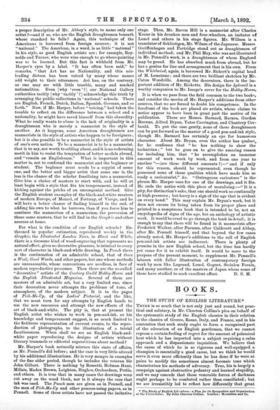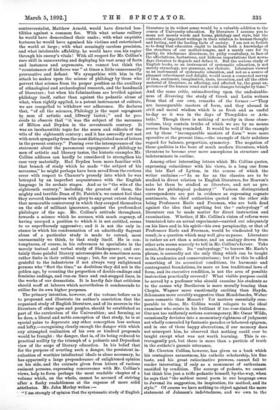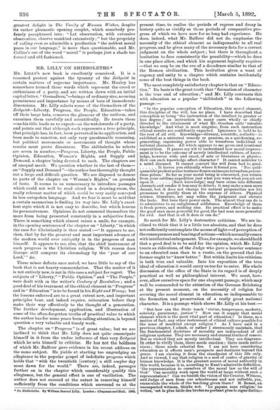BOOKS.
THE STUDY OF ENGLISH LITERATURE.*
THERE is so ranch that is not only just and sound, but prac- tical and salutary, in Mr. Churton Collins's plea on behalf of the systematic study of the English classics in their relation to the classics of Greece, Rome, Italy, and France, and in his- contention that such study ought to form a recognised part of the education of an English gentleman, that we cannot repress a certain feeling of regret for the amount of polemical heat which he has imported into a subject requiring a calm- approach and a dispassionate inquisition. We believe that the cause of which he is so vigorous and well-equipped a champion is essentially a good cause, but we think he would serve it even more efficiently than he has done if he were at pains to modify the sometimes almost forensic tone which characterises his methods of advocacy. True, bis is largely a campaign against obstructive pedantry and learned stupidity, and we may concede that these venerable forces of darkness ought perhaps to be combated rather than conciliated ; but we are irresistibly led to reflect how differently that great • The Study of English Literature: a Plea for its Recognition and Organisation at the Universities. By John Chtuton Collins. London Msomillan and Co. controversialist, Matthew Arnold, would have directed hos- tilities against a common foe. With what urbane raillery he would have demoralised their ranks ; with what exquisite -tortures he would have agonised his victims and entertained the world at large ; with what seemingly careless precision, and what intolerable affability, he would have run his rapier through his enemy's vitals ! With all respect for Mr. Collins's rare skill in manoeuvring and deploying his vast army of facts and instances and arguments, we cannot but think the -" countenance of his fierce war " at times a little unnecessarily provocative and defiant. We sympathise with him in the attack he makes upon the misuse of philology by those who pervert that science from its proper position as the auxiliary of ethnological and archaeological research, and the handmaid of literature ; but when his fulminations are levelled against philology itself, rather than against the pedantic abuse of what, when rightly applied, is a potent instrument of culture, we are compelled to withdraw our adherence. He declares that, "of all the sciences, Philology is the nIcist repugnant to men of artistic and literary tastes ; " and he pro- ceeds to observe thir "it was tre subject of the sarcasms of Milton and Dryden in the seventeenth century. It was an inexhaustible topic for the scorn and ridicule of the wits of the eighteenth century ; and it has assuredly not met with much sympathy from the most distinguished men of letters in the present century." Passing over the intemperance of the statement about the paramount repugnance of philology to men of artistic and literary tastes, the historic examples Mr. Collins adduces can hardly be considered to strengthen his case very materially. Had Dryden been more familiar with that branch of study which he made "the subject of his sarcasms," he might perhaps have been saved from the curious error with respect to Chaucer's prosody into which he was betrayed by an imperfect acquaintance with the English language in its archaic stages. And as to " the wits of the -eighteenth century," including the greatest of them, the mighty and terrible Dean of St. Patrick's, we cannot feel that they covered themselves with glory to any great extent during that memorable controversy in which they arrayed themselves on the side of militant ignorance, against the profoundest philologer of the age. Mr. Collins's attitude throughout, towards a science which he accuses, with much cogency, of having usurped a position to which it is not entitled, seems to us superfluously aggressive; and it is not the only in- stance in which his condemnation of an admittedly flagrant abuse of a particular study is made to extend, most unreasonably we think, to that study itself. He is con- temptuous, of course, in his references to specialists in the merely textual and verbal study of Shakespeare ; and cer- tainly those painful literary microscopists do sometimes seem rather finite in their critical range ; but, for our part, we are grateful to the industrious if not always very enlightened persons who "fleet the time," as doubtless they did not in the golden age, by counting the proportion of double-endings and feminine endings, and run-on lines and end-stopped lines, in the works of our dramatists. It is hardly fair that criticism should scoff at labours which nevertheless it condescends to utilise for its own higher purposes.
The primary intention, however, of the volume before us is to propound and illustrate its author's conviction that the organised study of English literature, and of its sources in the literature of other ages and peoples, should be established as part of the curriculum of the Universities ; and forming, as he does, a liberal and noble conception of that study, he is at special pains to deprecate any other conception less serious and lofty,—recognising clearly enough the danger with which any attempted realisation of his own or kindred proposals would be fraught : the danger, that is, of its being reduced to practical nullity by the triumph of a pedantic and Dryasdust view of the scope of literary education. In his belief that for the purpose of averting such a danger, the persistent in- culcation of worthier intellectual ideals is alone necessary, he has apparently a large preponderance of enlightened opinion on his side, and the extracts given from letters of various -eminent persons, expressing concurrence with Mr. Collins's views, help to form perhaps the most readable chapter of a volume which, on the whole, cannot be accused of striving after a flashy readableness at the expense of more solid attributes. Mr. John Morley writes :—
" I am strongly of opinion that the systematic study of English
literature in its widest sense would be a valuable addition to the course of University education. By literature I assume you to mean not merely words and forms, philology and style, but the contents of important writings in their relation to human thought and feeling, and the leading facts of society. I am not so foolish as to deny that education ought to include both a knowledge of the structure of our mother-tongue, and a manly care for its purity, its wholesome directness, its pithy vocabulary, in face of the affectations, barbarisms, and hideous importations that nowa- days threaten to degrade and deface it. But the serious study of English books, as an instrument of systematic education, is not merely etymology, nor grammar, nor rhetoric. Literature viewed as an instrument of systematic education, and not as a source of pleasant refreshment and delight, would mean a connected survey of idea, sentiment, imagination, taste, invention, and all the other material of literature, as affecting, and affected by, the great ex- periences of the human mind and social changes brought by time."
And the same critic, animadverting upon the undesirable- ness of divorcing the study of Greek and Latin writers from that of our own, remarks of the former :—" They are incomparable masters of form, and they abound in civil and moral wisdom which is as fresh and as useful to-day as it was in the days of Thucydides or Aris- totle." Though there is nothing of novelty in these obser- vations, they contain truths of which we are by no means averse from being reminded. It would be well if the example set by those " incomparable masters of form " were more operative at the present time,—the example of their sedulous regard for balance, proportion, symmetry. The negation of these qualities is the bane of much modern literature, which threatens to become ever more amorphous in structure and indeterminate in outline.
Among other interesting letters which Mr. Collins quotes, expressing coincidence with his views, is a long one from the late Earl of Lytton, in the course of which the writer exclaims :—" In so far as the classics are to be studied in direct relation to English literature, for Heaven's sake let them be studied as literature, and not as pre- texts for philological pedantry !" Various distinguished correspondents are put in evidence as expressing cognate sentiments, the chief authorities quoted on the other side being Professors Earle and Freeman, who are both dead against the idea that anything but the " embryology" of literature can be made matter for direct instruction and examination. Whether, if Mr. Collins's vision of reform were translated into an actual experiment—carried out adequately on his lines and in his spirit—his own perspicacity, or that of Professors Earle and Freeman, would be vindicated by the result, is a question which may well give as pause. Literature is rather an art than a science, and an analogy drawn from other arts seems scarcely to tell in Mr. Collins's favour. Take music, for example. Its " embryology," to borrow Mr. Earle's phrase, is assuredly not the only thing which can be taught in its academies and conservatoriums ; but if to this be added something of its acoustical conditions, its harmonic and contrapuntal foundations, its more or less traditional laws of form, and its executive rendition, is not the area of possible instruction practically covered? What visible purpose could be served by a professor who should examine his students as to the causes why Beethoven is more morally bracing than Chopin, Wagner more emotionally exciting than Haydn, Schumann more occultly suggestive than Mendelssohn, Weber more romantic than Mozart P Yet matters essentially com- parable to these, Mr. Collins would relegate to the ideal examiner who exists in his brilliant if too rose-tinted dream. Our not too uniformly serious contemporary, Mr. Oscar Wilde, occasionally deviates into a momentary rightness of judgment not wholly concealed by fantastic paradox or laboured epigram, and in one of these happy aberrations, if our memory does not misreport him, he observed that nothing could ever be taught except what was not worth learning. This is ex- travagantly put, but there is more than a particle of truth in the aesthete's gnomic utterance.
Mr. Churton Collins, however, has given us a book which his contagious earnestness, his catholic scholarship, his fine taste, and his great ratiocinative prowess, cannot fail to render interesting, if only as a monument of enthusiasm unstilted by erudition. The scourge of pedants, we cannot but think him just a trifle pedantic himself, by-the-way, when he says that " the noblest moral poem in our language owes to Juvenal its suggestion, its inspiration, its method, and its style." Of course we have nothing to object against the mere statement of Johnson's indebtedness, and we own to the
greatest delight in The Vanity of Human Wishes, despite its rather pleonastic opening couplet, which somebody pro- fanely paraphrased into : "Let observation, with extensive observation, observe mankind extensively ; " but the propriety of calling even so admirable a production "the noblest moral poem in our language," is more than questionable, and Mr. Collins's use of the word " moral" is perhaps just a shade too formal and old-fashioned.




































 Previous page
Previous page